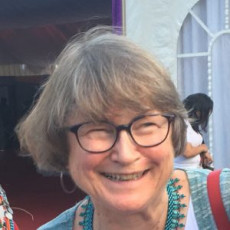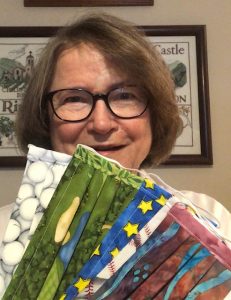“The purpose of life is not to be happy. It is to be useful, to be honorable, to be compassionate, to have it make a difference that you have lived and lived well.” Ralph Waldo Emerson
During a time of overwhelming crisis, we sometimes lose our belief that one person can make a difference. But, as we try to make sense of what is happening, try to differentiate what is real from what is purported, try to keep ourselves safe, it helps to think about how we can be part of the solution and then find a way to continue to make ourselves useful.
I have been making fabric masks since mid-March of this year. I started making them for family when I returned from Vietnam where face masks have been part of the culture for a while. I then donated a couple of dozen to the nursing home where my husband received care before his death. In the early days of the pandemic, regular supplies for face masks had dried up and they were desperate. Friends who know I sew, began asking if I would make masks for them, too. Suddenly, I had found a purpose in this time of isolation when other avenues of reaching out were closed. It wasn’t long before someone asked if they could pay for the masks. My response was “no,” but I realized that perhaps they were looking for a way to make a difference too. I suggested paying it forward with a donation to the Advocacy Project. And so they did. The response was beyond what I could have imagined.
The gift of a Protective Face Mask encouraged others to give. The money that was collected was then used to support mask-making projects in a number of AP’s partner countries. Women began making masks for their families, as I had, then for their friends and then for others who were willing to pay for them. Some of our partners started or continued soap-making projects with this AP support, soap being as necessary a commodity as masks. Where income had dried up due to quarantine, there was now a small lifeline to help them buy food and supplies for their families.
Now, we are looking for ways to expand and sustain these projects. The women are excited to continue their work and to use the skills they’ve learned, to welcome new members into their groups, and to consider additional ways of supporting their families. Just recently, there was an email from our partner in Kenya. In speaking of some of the possibilities for this work, she said, “It would be wonderful if you could find the money to support these – the Advocacy Project has already made such a difference to the lives of the ladies who took part.”
Hard times? Yes. Distressing times? Oh, yes! But we can still make a difference. Even in isolation, you can take action that may just reach around the world. Making face masks has improved the well-being of my own community, it has generated funds for others to be able to do the same, and it has renewed my own belief that each person has the potential to make a difference – and that usefulness can make you happy.
Posted By Barbara Fitzsimmons
Posted Jul 6th, 2020



2 Comments
Iain Guest
July 12, 2020
Bobbi – the more I read this blog, the more I feel that it contains some deeper meaning! Thanks to the idiocy of politicians who should know better, masks have become another source of division and even hatred instead of being the simple life-savers that they are undoubtedly are. But what do masks do for people like yourself – and our friends in Uganda, Nepal, Kenya and Zimbabwe, and Palestine – who actually make the masks? Think of what you’ve achieved! You addressed that first, critical need while others dithered; saved lives; and gave yourself a sense of purpose and achievement which has seen off the blues and kept the loneliness at bay! Masks may indeed be the symbol of this pandemic – or rather resistance to it. Thanks to you all!
Alexandra Mayer
July 17, 2020
Inspiring post, Bobbi. Thank you for sharing your hope with us. It is needed.